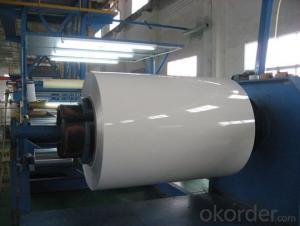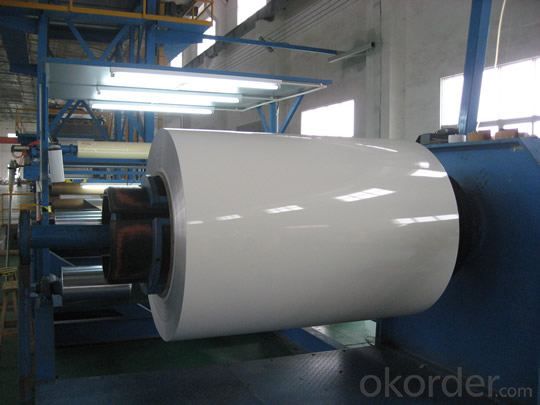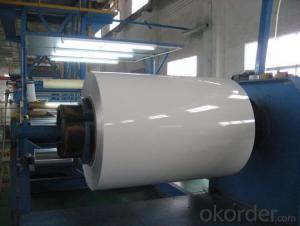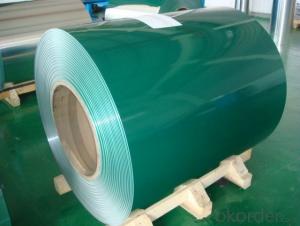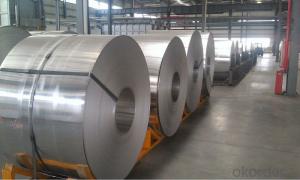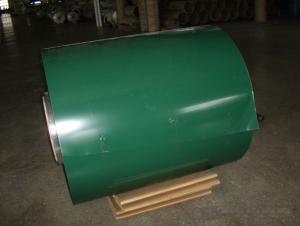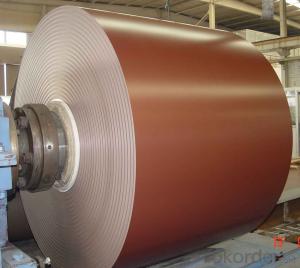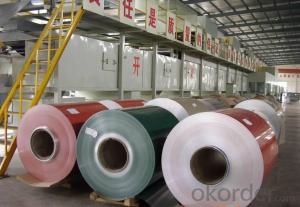032 PVDF 25 Micros Coated Aluminum Coil RAL 2001
- Loading Port:
- Shanghai
- Payment Terms:
- TT OR LC
- Min Order Qty:
- 2 m.t.
- Supply Capability:
- 50000 m.t./month
OKorder Service Pledge
OKorder Financial Service
You Might Also Like
Specification
Description
Alloy | 1050, 1060,1100, 3003 3004 3105 3A21 5005 5052 etc |
Temper | O/H12/H14/H1/H18/H32/H34/H36/H38//H111/H112/H116/H321/T6/T651/T3/T351 etc |
Thickness | 0.1mm to 6mm |
Width | 20mm to 3300mm |
Coil weight | 100kgs to 6 tons depends on actual requirement |
Core material | Aluminum or paper |
Coil inner diameter | 75mm, 150mm, 200mm, 300mm, 405mm, 505mm or as required |
Appplication | construction, roofing, decoration, lamping etc |
Package | eye to wall or eye to the wall for aluminum coil with wood pallet (wooded case also available) |
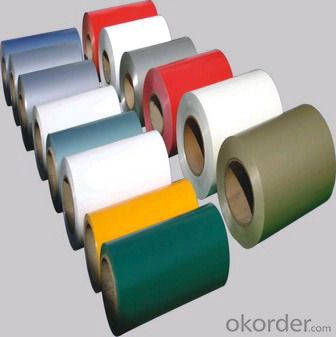
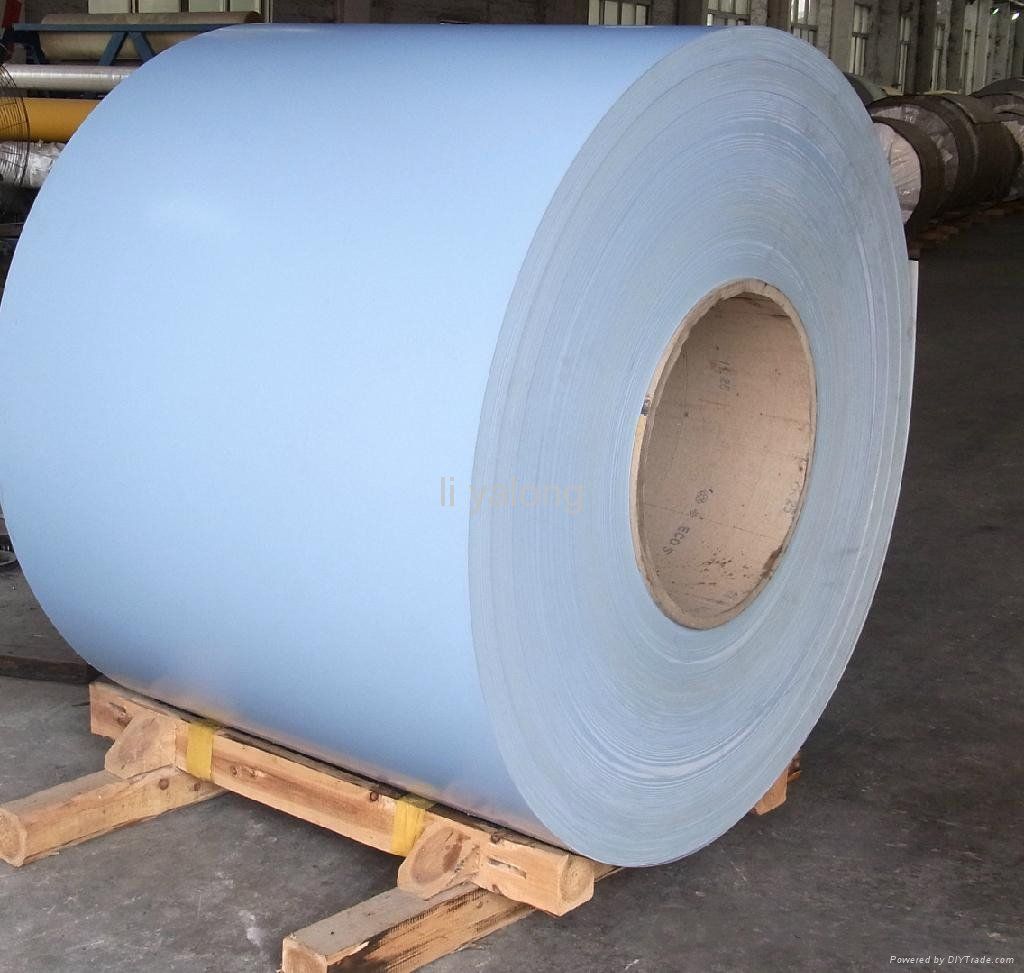
PE and PVDF Painting
Polyester Coatings (PE)
PE (polyester) coatings exhibit an excellent combination of hardness, flexibility, flow, appearance, and superior resistance to dirt retention in indoor and outdoor applications. These coatings are highly resistant to abrasion, metal marking, staining, and marring, and require minimal maintenance. Glazetech uses polyester paints which provide excellent colour and gloss retention properties.
Polyvinylidene Fluoride Coatings (PVDF)
PVDF (polyvinylidene fluoride) is a chemical resistant thick film barrier coating commonly used in architectural applications where both excellent appearance and substrate protection must be maintained over a long period of time. This coating is unaffected by most chemicals and solvents and has excellent wear and abrasion resistance. PVDF also has a high dielectric strength, excellent resistance to weathering and the ability to self extinguish.
Application
Widely used in manufacturing of products as well as other industrial applications like:
Products Materials: PP cap stock, the traffic sign, air-conditioner heat and exchangers, food container, household foil, pharmaceutical packing, cigarettes packing etc.
Building Materials: aluminum curtain wall base plate, ACP, aluminum, ceilings, aluminum sheets, honeycomb panels and aluminum roofing, lighting decoration, household electrical appliances, food package (such as pop can cover & ring-pull), furniture ect.
- Q: Are aluminum coils suitable for electrical conductivity?
- Yes, aluminum coils are suitable for electrical conductivity. Aluminum is a highly conductive material that has a conductivity rating of approximately 62% of the International Annealed Copper Standard (IACS). This makes aluminum coils an excellent choice for various electrical applications, including power transmission and distribution, electrical motors, and transformers. Additionally, aluminum coils offer advantages such as lightweight, high corrosion resistance, and lower cost compared to copper coils. However, it is important to note that aluminum has a lower conductivity than copper, so larger aluminum coils may be required to achieve the same level of conductivity as smaller copper coils. Overall, aluminum coils are a viable and commonly used option for electrical conductivity.
- Q: Is it possible to create baskets or containers using aluminum coils?
- <p>Yes, aluminum coils can be used to make baskets or containers. Aluminum is a lightweight, durable, and malleable material that can be easily shaped and bent into various forms. It is commonly used in manufacturing due to its strength and resistance to corrosion. For baskets or containers, aluminum coils can be woven or molded into the desired shape, offering both functionality and aesthetic appeal. However, it's important to consider the thickness and gauge of the aluminum to ensure the structure's stability and durability for its intended use.</p>
- Q: What is the hardness of aluminum coils?
- The hardness of aluminum coils can vary depending on factors such as the alloy used and the specific manufacturing process. However, in general, aluminum coils are known for their relatively low hardness compared to other metals.
- Q: Can aluminum coils be used in the production of signage?
- Yes, aluminum coils can be used in the production of signage. Aluminum is a versatile and durable material that is commonly used in the signage industry due to its lightweight nature, corrosion resistance, and ability to withstand various weather conditions. Aluminum coils can be easily shaped, cut, and formed into different shapes and sizes, making it ideal for creating custom signage. Additionally, aluminum coils can be coated with different finishes, such as paint or powder coating, to enhance their appearance and provide extra protection against fading and scratching. Overall, aluminum coils are a popular choice for signage production due to their versatility, durability, and aesthetic appeal.
- Q: How do aluminum coils contribute to lightweight vehicle design?
- Aluminum coils play a crucial role in achieving lightweight vehicle designs due to their unique properties and manufacturing processes. Aluminum is a lightweight material itself, weighing about one-third of the weight of steel, making it an ideal choice for lightweight vehicle design. When aluminum is formed into coils, it provides several benefits that contribute to the overall weight reduction of the vehicle. Firstly, aluminum coils are highly formable, allowing complex shapes to be achieved using less material. This property enables automakers to design intricate body panels and structural components that are not only lightweight but also offer improved aerodynamics and fuel efficiency. The ability to form aluminum coils into intricate shapes also allows for increased design flexibility, leading to more innovative and visually appealing vehicle designs. Secondly, aluminum coils offer exceptional strength-to-weight ratio, making them an excellent choice for structural components. Despite being lightweight, aluminum coils provide excellent structural integrity, ensuring the vehicle's safety and durability. By incorporating aluminum coils into the vehicle's chassis, suspension systems, and other critical components, automakers can reduce weight while maintaining the necessary strength and rigidity required for safe operation. Furthermore, aluminum coils have excellent corrosion resistance, which is essential for the longevity of the vehicle. Corrosion can significantly impact a vehicle's structural integrity and overall performance. By using aluminum coils, automakers can reduce the risk of corrosion-related issues, leading to longer lifespan and reduced maintenance costs. Lastly, the use of aluminum coils helps in reducing the overall weight of the vehicle, resulting in improved fuel efficiency and reduced greenhouse gas emissions. Lighter vehicles require less energy to accelerate and maintain speed, leading to better fuel economy. This benefit is increasingly important as the automotive industry focuses on developing more sustainable and eco-friendly vehicles. In conclusion, aluminum coils contribute significantly to lightweight vehicle design by offering high formability, exceptional strength-to-weight ratio, corrosion resistance, and overall weight reduction. These properties enable automakers to design vehicles that are not only lighter but also safer, more fuel-efficient, and visually appealing. As the demand for lightweight vehicles increases, aluminum coils play a vital role in achieving these design goals.
- Q: Are aluminum coils suitable for architectural cladding applications?
- Yes, aluminum coils are suitable for architectural cladding applications. Aluminum is a versatile material that offers a range of benefits for cladding purposes. Firstly, aluminum is lightweight, making it easy to handle and install. This reduces the overall weight on the building structure and simplifies the construction process. Additionally, aluminum is highly durable and resistant to corrosion. This makes it an ideal choice for exterior applications, as it can withstand harsh weather conditions and maintain its appearance over time. Furthermore, aluminum coils can be fabricated into various shapes and sizes, allowing for flexibility in design. They can be easily formed, cut, and shaped to meet the specific requirements of the building project. Aluminum is also available in a wide range of finishes and colors, providing architects and designers with ample options to achieve the desired aesthetic for the cladding. Moreover, aluminum is a sustainable choice as it is 100% recyclable. This aligns with the growing focus on environmentally friendly construction practices. Overall, the versatility, durability, lightweight nature, and aesthetic options make aluminum coils a suitable choice for architectural cladding applications.
- Q: What are the potential applications of perforated aluminum coils?
- Perforated aluminum coils offer a wide range of potential applications due to their unique characteristics and versatility. Here are some of the potential uses of perforated aluminum coils: 1. Architectural applications: Perforated aluminum coils can be used in architectural projects for facades, sunscreens, and cladding systems. The perforations can create aesthetically pleasing designs while also providing ventilation and sun control. 2. Filtration systems: The perforated holes in aluminum coils allow them to be used as filters for various applications. They can be utilized in air, liquid, or gas filtration systems, ensuring the removal of contaminants while maintaining an efficient flow. 3. Industrial equipment: Perforated aluminum coils can be incorporated into industrial equipment such as heat exchangers, condensers, and evaporators. The perforations aid in heat transfer, promoting efficient cooling or heating processes. 4. Automotive industry: The lightweight and durable nature of perforated aluminum coils make them suitable for the automotive industry. They can be used in the manufacturing of automobile parts like grilles, radiator covers, and engine components, providing both functionality and aesthetic appeal. 5. Acoustic panels: The perforations in aluminum coils can help in sound absorption and noise reduction. They can be used in the construction of acoustic panels for auditoriums, theaters, recording studios, and other spaces where sound quality is crucial. 6. Decorative applications: Perforated aluminum coils can be utilized for decorative purposes in interior design projects. They can be shaped into screens, room dividers, or wall panels, creating visually appealing patterns and adding a touch of modernity to spaces. 7. Agricultural applications: Perforated aluminum coils can find applications in the agricultural sector. They can be used in crop protection systems, allowing for controlled air circulation while protecting plants from pests or excessive sunlight. 8. Energy-efficient solutions: The perforations in aluminum coils can be beneficial for energy-efficient applications. They can be incorporated into solar panels, allowing light to pass through while maintaining structural integrity. Overall, perforated aluminum coils offer a wide range of potential applications across various industries, including architecture, filtration, industrial equipment, automotive, acoustic panels, decorative projects, agriculture, and energy-efficient solutions. The versatility, lightweight, durability, and aesthetic appeal of these coils make them a popular choice for many different uses.
- Q: This question asks for the current prices of aluminum coil in various regions around the world.
- <p>The price of aluminum coil can vary significantly based on factors such as market demand, supply, transportation costs, and regional economic conditions. Prices are typically quoted per metric ton and are influenced by the London Metal Exchange (LME) and regional metal exchanges. For the most accurate and up-to-date prices, it's best to consult with local metal suppliers or check online commodity trading platforms. Prices can change daily, so real-time data is essential for making informed decisions.</p>
- Q: Are aluminum coils suitable for food and beverage packaging?
- Food and beverage packaging can indeed utilize aluminum coils. Aluminum, being a versatile material, offers numerous advantages for packaging purposes. Its lightweight nature makes transportation and handling a breeze. Furthermore, its exceptional resistance to corrosion ensures that the packaging remains intact, safeguarding the contents from external elements. Additionally, aluminum boasts excellent thermal conductivity, enabling efficient heat transfer, which proves advantageous for temperature-sensitive food and beverage items. Moreover, it acts as a formidable barrier, impermeable to light, moisture, and oxygen, thereby maintaining the quality and freshness of the packaged goods. Furthermore, aluminum's recyclability and reusability make it an environmentally friendly choice for packaging. Consequently, aluminum coils emerge as a dependable and fitting option for food and beverage packaging, courtesy of their durability, protective properties, and sustainability.
- Q: What are the different coil handling methods for aluminum coils?
- To ensure the safe and efficient handling and storage of valuable aluminum coils, there are various methods available. Here are several options: 1. Manual Handling: This approach involves the physical lifting and movement of aluminum coils using manual labor. It necessitates proper training and the use of personal protective equipment to prevent injuries. Manual handling is suitable when dealing with smaller coils or when specialized equipment is unavailable. 2. Forklift Handling: Forklifts are commonly utilized for the handling of aluminum coils. They come equipped with specially designed coil lifters or C-hooks, which securely lift and transport the coils. Forklifts offer a more efficient and quicker method for handling larger and heavier coils. 3. Coil Lifters: Coil lifters are specialized lifting devices specifically designed for aluminum coil handling. They utilize a combination of clamps and hooks to securely grip and transport the coils. Coil lifters are often used alongside cranes or forklifts. 4. C-Hooks: C-hooks are another commonly employed method for handling aluminum coils. These hooks are attached to cranes or other lifting equipment and are designed to securely cradle the coil. C-hooks facilitate easy and controlled movement of the coil and are suitable for coils of various sizes. 5. Coil Tippers: Coil tippers are utilized to tilt the coils horizontally or vertically, making loading or unloading easier. This method reduces the risk of coil damage during handling and enhances efficiency by enabling coils to be easily placed on or removed from racks or pallets. 6. Coil Carriers: Coil carriers refer to specialized trailers or trucks specifically designed for transporting aluminum coils. They feature built-in coil cradles or beds that securely hold the coils during transportation. These carriers often have adjustable supports to accommodate different coil sizes and prevent shifting during transit. Ultimately, the choice of coil handling method depends on factors such as coil size, weight, and specific requirements. It is crucial to select the appropriate handling method to ensure worker safety, prevent coil damage, and maintain the quality of the aluminum.
Send your message to us
032 PVDF 25 Micros Coated Aluminum Coil RAL 2001
- Loading Port:
- Shanghai
- Payment Terms:
- TT OR LC
- Min Order Qty:
- 2 m.t.
- Supply Capability:
- 50000 m.t./month
OKorder Service Pledge
OKorder Financial Service
Similar products
Hot products
Hot Searches
Related keywords
